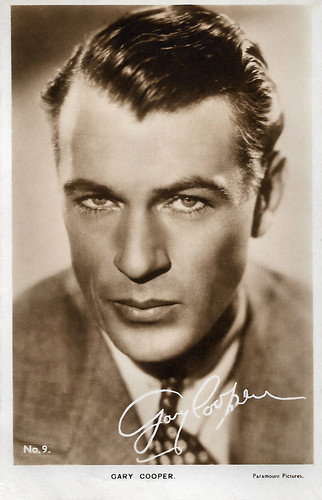
British postcard in the 'Film-Kurier' Series, London, no. 9. Photo: Paramount Pictures.
American screen legend Gary Cooper (1901-1961) is well remembered for his stoic, understated acting style in more than one hundred Westerns, comedies and dramas. He received five Oscar nominations and won twice for his roles as Alvin York in Sergeant York (1941) and as Will Kane in High Noon (1952).

British postcard in the 'Film-Kurier' Series, London, no. 11. Photo: Metro-Goldwyn-Mayer.
American actor, television director, producer, and executive Jackie Cooper (1922-2011) was one of the most popular child stars of the 1930s. He is also the youngest performer to have been nominated for an Oscar for Best Actor in a Leading Role, for Skippy (1931). He was one of the few child actors who managed to make the transition to an adult career. In later life, he produced and directed over 250 films and television shows.
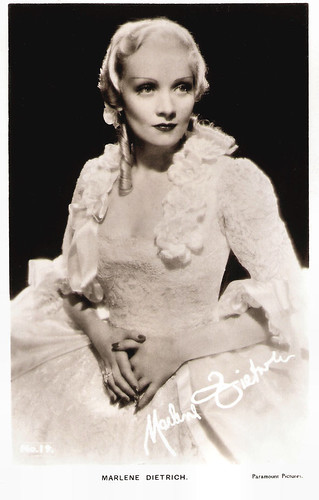
British postcard by 'Film-Kurier' Series, London, no. 19. Photo: Paramount Pictures. Marlene Dietrich in The Scarlet Empress (Josef von Sternberg, 1934).
Marlene Dietrich (1901-1992) is regarded as the first German actress to become successful in Hollywood. Throughout her long career, she constantly re-invented herself, starting as a cabaret singer, chorus girl and film actress in 1920s Berlin, she became a Hollywood movie star in the 1930s, a World War II frontline entertainer, and finally an international stage show performer from the 1950s to the 1970s, eventually becoming one of the entertainment icons of the 20th century.
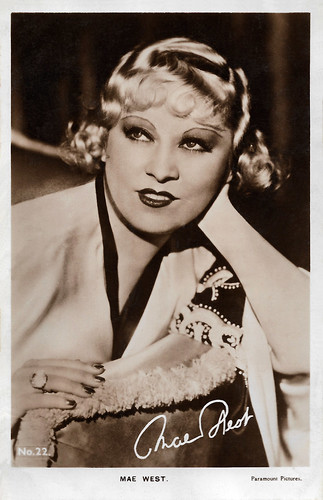
British postcard by 'Film-Kurier' Series, London, no. 22. Photo: Paramount Pictures.
Blonde Mae West (1895-1982) was a seductive, overdressed, endearing, intelligent, and sometimes vulgar American actress and sex symbol. She featured a come-hither voice, aggressive sexuality, and a genius for comedy. West started in Vaudeville and on the stage in New York, and later moved to Hollywood to star in such films as I’m No Angel (1933), She Done Him Wrong (1933), and Klondike Annie (1936). She was one of the first women in the cinema to consistently write the films she starred in.
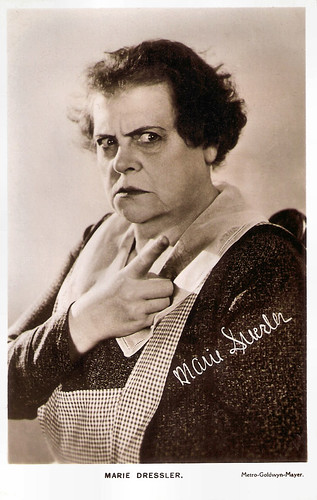
British postcard in the 'Film-Kurier' Series, London, no. 31. Photo: Metro-Goldwyn-Mayer (MGM). Marie Dressler in Christopher Bean (Sam Wood, 1933).
Canadian actress Marie Dressler (1868-1934) began her career in the theatre and became famous as a comedy actress. In the early sound film era, Dressler rose to become one of Hollywood's biggest stars. In 1931 she won the Oscar for Best Actress in a Leading Role for her performance in Min and Bill (1931).

British postcard in the 'Film-Kurier' Series, London, no. 39. Photo: Metro-Goldwyn-Mayer.
Maureen O'Sullivan (1911-1998) was an Irish actress best known for playing Jane in the Tarzan series of films starring Johnny Weissmuller.

British postcard in the 'Film-Kurier' Series, no. 43. Photo: London Film Production.
Indian-born British actress Merle Oberon (1911-1979) had her breakthrough as Anna Boleyn in The Private Life of Henry VIII (1933). She played leading roles in such British films as The Scarlet Pimpernel (1934), before she travelled to Hollywood to star in classics such as The Dark Angel (1935) and Wuthering Heights (1939).

British postcard in the 'Film-Kurier' Series, London, no. 45. Photo: Paramount Pictures.
American film actress Carole Lombard (1908–1942) was the highest-paid star in Hollywood in the late 1930s. She was particularly noted for her energetic, ditzy, and often off-beat roles in screwball comedies of the 1930s.
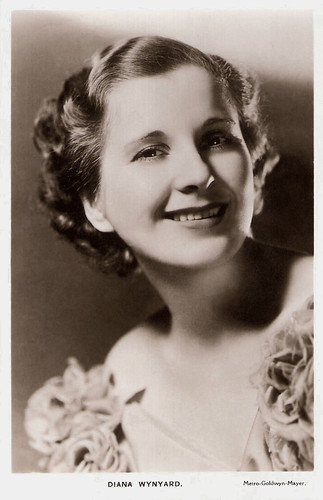
British postcard in the 'Film-Kurier' Series, London, no. 63. Photo: Metro-Goldwyn-Mayer.
Elegant and aristocratic British actress Diana Wynyard (1906-1964) was a leading lady on the London stage. She also had a brief and largely unsatisfactory Hollywood career but returned to the screen successfully in England in the first film version of Gas Light (1940), and although she didn't make many films, she had a secure place in the roll call of great British film stars.
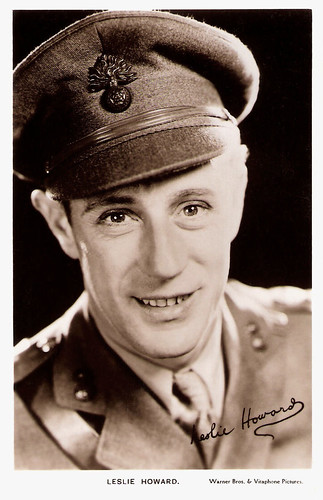
British postcard in the 'Film-Kurier' Series, London, no. 64. Photo: Warner Brothers & Vitaphone Pictures.
English stage and film actor, director, and producer Leslie Howard (1893-1943) is best known for his role as Ashley Wilkes in Gone with the Wind (1939). Other popular films were The Scarlet Pimpernel (1934), The Petrified Forest (1936), Pygmalion (1938), and Intermezzo (1939). During the Second World War, he was active in anti-Nazi propaganda. In 1943 his airliner was shot down, and this sparked modern conspiracy theories regarding his death.
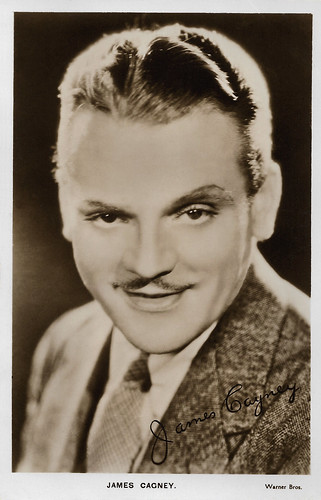
British postcard in the 'Film-Kurier' Series, London. no. 70. Photo: Warner Bros.
Energetic, wise-cracking James Cagney (1899-1986) was an American film actor, famous for his gangster roles in the 1930s and 1940s. One of the brightest stars of the Golden Age of Hollywood, Cagney was not only a multifaceted tough guy but also an accomplished dancer and he easily played light comedy.
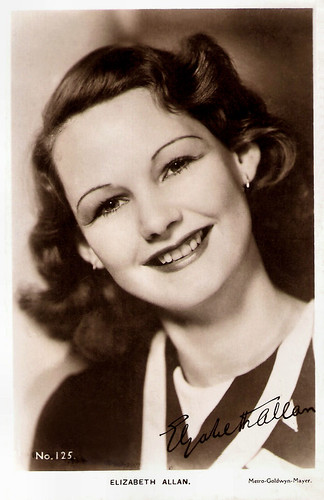
British postcard by Real Photograph in the 'Film-Kurier' Series, no. 125. Photo: Metro-Goldwyn-Mayer.
English actress Elizabeth Allan (1910-1990) worked in both Britain and Hollywood, making about 50 films over more than a quarter century.

British postcard in the 'Film-Kurier' Series, London, no. 131. Photo: Metro-Goldwyn-Mayer.
With his natural charm and knowing smile, Clark Gable (1901-1959) was 'The King of Hollywood' during the 1930s. He often portrayed down-to-earth, bravado characters with a carefree attitude, and was seen as the epitome of masculinity. Gable won an Academy Award for Best Actor for It Happened One Night (1934), and was nominated for leading roles in Mutiny on the Bounty (1935) and for his best-known role as Rhett Butler in Gone with the Wind (1939).
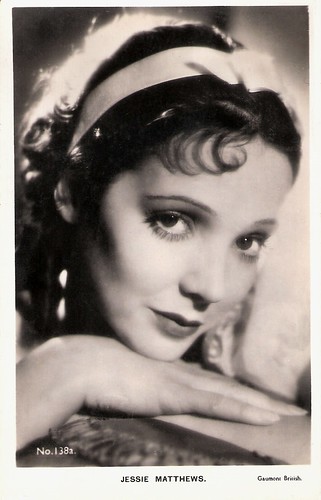
British postcard in the 'Film-Kurier' Series, London, no. 138a. Sent by mail in Great Britain in 1937. Photo: Gaumont British.
Saucer-eyed, long-legged Jessie Matthews (1907-1981) was a gamine, graceful dancer, with a sweet, pure-toned singing voice, and waif-like sex appeal, who embodied 1930s style. For most of the decade, she was the most popular musical star in England and ranked on par with Fred Astaire, Ruby Keeler, and Ginger Rogers. She was a favourite of Irving Berlin and Richard Rodgers & Lorenz Hart, all of whom gave her some of their very best work. Her personal life was blighted by relationship breakdowns and her struggles against ill health and insecurity.

British postcard in the 'Film-Kurier' Series, London, no. 143. Photo: Universal Pictures.
Margaret Sullavan (1909-1960) was an American stage and film actress. She is best remembered opposite James Stewart in Ernst Lubitsch's The Shop Around the Corner (1940).
Sources: Wikipedia (German) and Classic Film Collectibles.
No comments:
Post a Comment